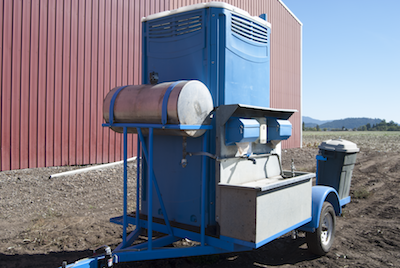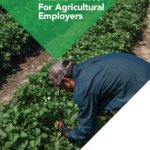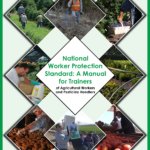Exceptions and Exemptions
Exceptions/Exemptions to Pesticide Safety Training
Exceptions related to PPE
Exceptions related to Decontamination Supplies
Exceptions related to Immediate Family
Exceptions related to Crop Advisors
Looking for more exceptions?
The WPS requires agricultural employers and commercial pesticide handler employers to provide specific information and protections to workers, handlers, and other persons when WPS-labeled pesticide products are used on agricultural establishments in the production of agricultural plants.
Agricultural Activities that are/are not Covered
The WPS applies only to employees who perform activities in the left column (directly related).
WPS applies to activities that are directly related to producing agricultural plants
- Harvesting
- Thinning
- Hand-weeding
- Pest-scouting
- Pruning
- Planting
- Preparing sites/media for planting
- Carrying nursery stock
- Watering
WPS does NOT apply to activities that are not directly related to producing agricultural plants
- Delivering materials to the establishment
- Buying pesticides or application equipment
- Carrying/moving pesticide containers that have never been opened
- Post-harvest handling of agricultural products outside the treated area(s)
- Caring for livestock
- Using herbicides in non-agricultural areas like roadsides and parking lots
- Performing pest control activities in offices/buildings that are not used for agricultural production
- Performing government-sponsored pest control campaign activities such as mosquito abatement and regional eradication efforts (i.e., Mediterranean fruit fly)
- Beekeeping activities
- Fire-fighting activities (unless fires are planned)
- The WPS does not apply to home/garden-type products that lack WPS labeling. Learn more about WPS labeling in our "Does it Apply?" decision tree.
- It's not an agricultural establishment if plants are only stored or transported, and no production/maintenance activities are performed. The WPS does not apply to non-agricultural establishments.
Exceptions/Exemptions to Pesticide Safety Training
The following individuals are exempt from the requirement for annual pesticide safety training for workers and/or handlers:
- Certified/licensed pesticide applicators
- Certified crop advisors
- Agricultural workers who never enter treated areas within 30 days of pesticide application, or within 30 days of the end of a restricted-entry interval (REI).
- Certain members of the establishment owner's immediate family.
- A person who has satisfied the handler training requirements is not required to take pesticide safety training for workers.
Exceptions related to PPE
Leather boots and gloves
- If chemical-resistant footwear with sufficient durability and a tread appropriate for wear in rough terrain is not obtainable, then leather boots may be worn on such terrain.
- If chemical-resistant gloves with sufficient durability and suppleness are not obtainable, then during activities with plants with sharp thorns, leather gloves may be worn over chemical-resistant glove liners. However, once leather gloves are worn for this use, thereafter they must only be worn with chemical-resistant liners. They must not be worn for any other use.
Body protection
- A chemical-resistant suit may be substituted for coveralls. If a chemical-resistant suit is substituted for coveralls, any labeling requirement for an additional layer of clothing beneath the coveralls is waived.
- A chemical-resistant suit may be substituted for a chemical-resistant apron.
Closed systems
When a closed system is used to mix or load pesticide products, all of the following conditions must be met in order to substitute the label-required PPE:
- The closed system must be able to remove the pesticide from its original container and transfer the pesticide product through connecting hoses, pipes and couplings that are sufficiently tight to prevent exposure of handlers to the pesticide product, except for the negligible escape associated with normal operation of the system (including use of intact water-soluble packaging); AND
- Each closed system must have written operating instructions that are clearly legible and available to any handlers who use the system. The instructions must be made available at the mixing and loading site. They must include:
- operating procedures for use, including the safe removal of a probe,
- maintenance, cleaning and repair,
- known restrictions or limitations relating to the system, such as incompatible pesticides or sizes/types of containers or closures that cannot be handled by the system,
- any limits on the ability to measure a pesticide, and
- special procedures or limitations regarding partially-filled containers; AND
- Any handler operating the closed system must be trained in its use and operate the closed system in accordance with its written operating instructions.
- The closed system must be cleaned and maintained as specified in the written operating instructions and as needed to make sure the system functions properly.
- All PPE specified in the pesticide product labeling is immediately available to the handler for use in an emergency.
- Protective eyewear must be worn when using closed systems operating under pressure.
If all of the above conditions (1-6) are met, then handlers using a closed system to mix/load pesticides with a signal word of "DANGER" or "WARNING" may substitute the following, instead of the PPE specified on the product label:
- Long-sleeved shirt,
- Long pants,
- Shoes and socks,
- Chemical-resistant apron,
- Protective eyewear, and
- Protective gloves specified on the labeling for handlers.
If all of the above conditions (1-6) are met, then handlers using a closed system to mix/load pesticides with a signal word of “CAUTION” (or no signal word) may substitute the following, instead of the PPE specified on the product label:
- Long sleeved shirt,
- Long pants
- Shoes and socks, and
- Protective eyewear.
Enclosed cabs
If a handler applies a pesticide from inside a vehicle’s enclosed cab and all of the PPE required by the pesticide product labeling for applicators is immediately available and stored in a sealed container to prevent contamination, handlers may substitute a long-sleeved shirt, long pants, shoes and socks for the labeling-specified PPE for skin and eye protection.
- If a particulate filtering respirator (NIOSH approval number prefix TC-84A, which used to be called a dust/mist filtering respirator) is required by the pesticide product labeling for applicators, the applicator does not have to wear that respirator inside the enclosed cab if the enclosed cab has a properly functioning air ventilation system which is used and maintained in accordance with the manufacturer’s written operating instructions.
- If any other type of respirator is required by the pesticide labeling for applicators, then that respirator must be worn inside the enclosed cab.
Handlers must wear the applicator PPE required by the pesticide product labeling if they exit the cab within a treated area during an application or when an REI is in effect. Once PPE is worn in a treated area, it must be removed before reentering the cab to prevent contamination of the cab.
Aerial applicators
Wearing chemical-resistant gloves when entering or leaving an aircraft used to apply pesticides is optional, unless such gloves are required on the pesticide product labeling. If gloves are brought into the cockpit of an aircraft that has been used to apply pesticides, the gloves must be kept in an enclosed container to prevent contamination of the inside of the cockpit.
- Handlers applying pesticides from an open-cockpit aircraft must use the PPE specified in the pesticide product labeling for use during an application, except that chemical-resistant footwear need not be worn.
- A helmet may be substituted for chemical-resistant headgear.
- A helmet with a face shield lowered to cover the face may be substituted for protective eyewear.
- Persons occupying an enclosed cockpit may substitute a long sleeved shirt, long pants, shoes, and socks for labeling-specified PPE.

Looking for more exceptions?
There is no specific exemption in the Worker Protection Standard for the following establishments. The WPS applies to all of these:
- Organic agricultural establishments
- Research establishments that produce agricultural plants
- Indoor agricultural establishments
- Plant-production facilities/sites associated with parks and golf courses
- Forestry operations (for wood/fiber production)

Regulatory Guidance
Browse brief guides about protections for workers and handlers, the AEZ, posting, PPE, exemptions, training, respirators, and more, in English and Spanish.

